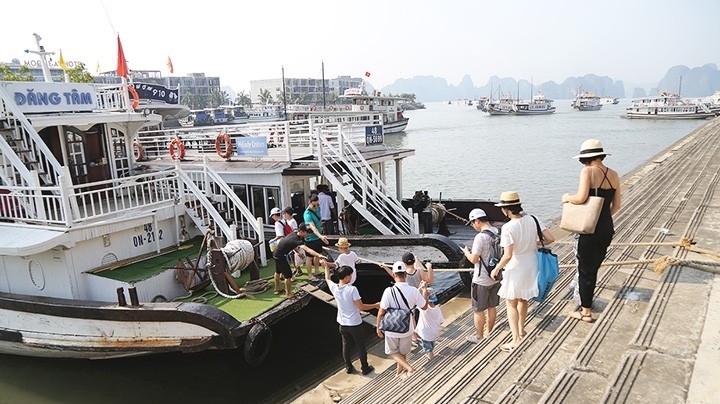Earlier, in early May 2023, the Thua Thien Hue Police had to coordinate with the Inspectorate of the Provincial Department of Tourism to track down individuals who were scamming tourists by selling them cheap hotel rooms...
As the peak summer tourist season approaches, scams and fraudulent schemes are becoming more prevalent and sophisticated. Taking advantage of the increased demand for travel, especially the desire for cheap prices, many individuals have launched attractive advertisements on social media to deceive and steal money.
The most common tactic is posting advertisements selling tour packages, travel combos, and hotel rooms at "super bargain" prices with many included amenities. Once they've lured in uninformed, cheap customers, they ask them to transfer a deposit (via bank card) and then steal the money.

Tourists should be cautious when choosing cheap tours. (Photo: LE MINH)
To gain the trust of tourists, these individuals do not hesitate to create fake websites or fan pages of reputable travel companies, even forging receipts and payment invoices. Many are also willing to "buy comments" on fan pages or create fake interactions and comments, displaying transaction history to show that many people have purchased the service and have positive reviews to "trap" tourists who are looking for cheap deals.
Even more sophisticatedly, they established a coordinated network so that before transferring the deposit, if customers still had doubts, they could call a landline number (provided by the websites) to verify information. Someone would always answer the phone and confirm the company and employee information, making it seem genuine. Some perpetrators, after receiving the deposit, would immediately send flight ticket codes, hotel booking codes, etc., to reassure customers that everything was settled, but in reality, these were just reservation codes that would automatically cancel if payment was not made.
Amidst the "maze" of scams, even a slight lack of caution can easily lead tourists into the trap of cheap travel. Recently, many people have been shocked to realize they've been scammed when they arrive at the airport unable to book tickets, find their accommodation not listed in the booking system, or try to contact the seller only to find out their number is unreachable.
Recently, there have been cases of individuals offering visa services for overseas travel promising a 100% success rate. After receiving a partial payment, these individuals only provide perfunctory guidance, leaving clients to fill out the information and complete the application themselves. They then claim the client's application was incomplete, resulting in a visa rejection, and refuse to refund the money. Alongside this are cases of scammers stealing users' social media accounts, using technology to create fake images and calls – seemingly authentic – to stage a fake "stranded" situation while traveling abroad in order to borrow money urgently from their friends list...
In the context of the entire tourism industry striving to recover and accelerate development after the Covid-19 pandemic, the proliferation of the aforementioned fraudulent activities not only disrupts and negatively impacts the tourism environment but also erodes trust and creates skepticism among tourists – even when they receive genuine promotional programs.
To help prevent and combat this situation, the Ministry of Public Security recently issued a recommendation that people should carefully research information when choosing travel packages; they should choose tour, hotel, and flight booking services from reputable companies or through popular travel applications. People have the right to request to see the business license, documents, and professional certificates of the travel and tourism company.
In addition, people need to pay attention to the signs of fake websites. The domain names of fake websites often have extra or missing characters, and frequently use unusual extensions such as: “.cc”, “.xyz”, “.tk”… For online buying and selling on social media, people should choose social media pages with a blue checkmark (indicating registered accounts) or choose reputable social media pages where they know the seller's information.
According to experts, to clean up the tourism business environment, in addition to strengthening inspection and supervision and strictly punishing those who engage in fraudulent activities, it is more important to raise awareness and vigilance among people when choosing tourism services. Most tourism scams occur online, while social media accounts are easy to create and delete.
Therefore, to avoid being scammed, customers should not transact with individuals whose information is unclear; absolutely do not transfer money to accounts that are not directly owned by the company; and should go to the company's headquarters to verify transactions instead of relying solely on social media.
In particular, people need to be cautious about travel services offered at unusually low prices, as such deep discounts are unlikely given the high costs of airfare, fuel, and operations. Tourists should also take screenshots of the tour seller's video call, save photos of the seller's ID card, and images of completed transactions... as evidence to report any scams if they unfortunately become victims.

 VI
VI EN
EN

































